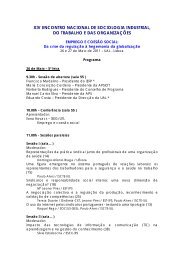Web-based Learning Solutions for Communities of Practice
Web-based Learning Solutions for Communities of Practice
Web-based Learning Solutions for Communities of Practice
Create successful ePaper yourself
Turn your PDF publications into a flip-book with our unique Google optimized e-Paper software.
A Proposed Framework <strong>for</strong> Designing Sustainable <strong>Communities</strong> <strong>for</strong> Knowledge Management Systems<br />
Kankanhalli, A., Tan, B. C. Y., & Kwok-Kei, W.<br />
(2005). Contributing knowledge to electronic<br />
knowledge repositories: An empirical investigation.<br />
MIS Quarterly, 29(1), 113-143.<br />
King, W. R. (2006). The critical role <strong>of</strong> in<strong>for</strong>mation<br />
processing in creating an effective knowledge<br />
organization. Journal <strong>of</strong> Database Management,<br />
17(1), 1-15.<br />
Koeglreiter, G., Smith, R., & Torlina, L. (2006).<br />
The role <strong>of</strong> in<strong>for</strong>mal groups in organisational<br />
knowledge work: Understanding an emerging<br />
community <strong>of</strong> practice. International Journal <strong>of</strong><br />
Knowledge Management, 2(1), 6-23.<br />
Kohlhase, M., & Anghelache, R. (2004). Towards<br />
collaborative content management and version<br />
control <strong>for</strong> structured mathematical knowledge.<br />
In Proceedings Mathematical Knowledge Management:<br />
2nd International Conference, MKM<br />
2003, Bertinoro, Italy,.<br />
Lapre, M. A., & Van Wassenhove, L. N. (2003).<br />
Managing learning curves in factories by creating<br />
and transferring knowledge. Cali<strong>for</strong>nia Management<br />
Review, 46(1), 53-71.<br />
Lave, J., & Wenger, E. (1991). Situated learning.<br />
Legitimate peripheral participation. Cambridge:<br />
Cambridge University Press.<br />
Leimeister, J. M., Ebner, W., & Krcmar, H. (2005).<br />
Design, implementation, and evaluation <strong>of</strong> trustsupporting<br />
components in virtual communities<br />
<strong>for</strong> patients. Journal <strong>of</strong> Management In<strong>for</strong>mation<br />
Systems, 21(4), 101-135.<br />
Licklider, J., & Taylor, R. (1968). The computer<br />
as a communication device. Sci. Tech.<br />
Lippman, S. A., & Rumelt, R. P. (1982). Uncertain<br />
imitability: An analysis <strong>of</strong> interfirm differences<br />
in efficiency under competition. Bell Journal <strong>of</strong><br />
Economics, 13, 418-438.<br />
Malhotra, A., Gosain, S., & Hars, A. (1997).<br />
Evolution <strong>of</strong> a virtual community: Understand-<br />
ing design issues through a longitudinal study.<br />
International Conference on In<strong>for</strong>mation Systems<br />
(ICIS), AIS.<br />
Markus, L. M. (1987). Towards a critical mass<br />
theory <strong>of</strong> interactive media: Universal access,<br />
interdependence and diffusion. Comm. Res., 14,<br />
491-511.<br />
Markus, L. M. (2001). Towards a theory <strong>of</strong> knowledge<br />
reuse: Types <strong>of</strong> knowledge reuse situations<br />
and factors in reuse success. Journal <strong>of</strong> Management<br />
In<strong>for</strong>mation Systems, 18(1), 57-94.<br />
Markus, L. M., Majchrzak, A., & Gasser, L.<br />
(2002). A design theory <strong>for</strong> systems that support<br />
emergent knowledge processes. MIS Quarterly,<br />
26(3), 179-212.<br />
McDermott, R. (1999a). How to get the most out<br />
<strong>of</strong> human networks: Nurturing three-dimensional<br />
communities <strong>of</strong> practice. Knowledge Management<br />
Review, 2(5), 26-29.<br />
McDermott, R. (1999b). Why in<strong>for</strong>mation inspired<br />
but cannot deliver knowledge management. Cali<strong>for</strong>nia<br />
Management Review, 41(4), 103-117.<br />
Nidumolu, S. R., Subramani, M., & Aldrich,<br />
A. (2001). Situated learning and the situated<br />
knowledge web: Exploring the ground beneath<br />
knowledge management. Journal <strong>of</strong> Management<br />
In<strong>for</strong>mation Systems (JMIS), 18(1), 115-150.<br />
Nonaka, I. (1994). A dynamic theory <strong>of</strong> organizational<br />
knowledge creation. Organization Science,<br />
5(1), 14-37.<br />
Orlikowski, W. J. (2002). Knowing in practice:<br />
Enacting a collective capability in distributed organizing.<br />
Organization Science, 13(3), 249-273.<br />
Orr, J. E. (1989). Sharing knowledge, celebrating<br />
identity: War stories and community memory<br />
among service technicians. In D.S. Middleton,<br />
& D. Edwards (Eds.), Collective remembering:<br />
memory in society. Newbury Park, CA: Sage<br />
Publications.<br />
227



